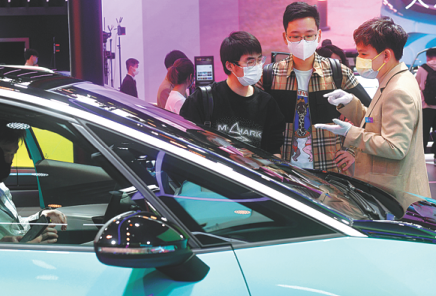Innovation crucial for domestic NEV makers

Expansion of production capacity and development of self-innovated technologies in new energy vehicles will be prioritized by Chinese car manufacturers as the automobile industry is fast shifting toward electrification, according to industry insiders.
"Production capacity expansion is based on the fast growing market demand for electric vehicles," said Gu Huinan, general manager of GAC Aion.
Aion, the NEV arm of GAC Group, is based in Guangzhou, capital of Guangdong province. Aion launched its SUV LX Plus, which has a range of more than 1,000 kilometers on a single charge, during the Guangzhou International Auto Show.
During the show, which will conclude its 19th session on Sunday, a total of 241 new energy cars are being displayed, of which 153 are made by Chinese car manufacturers, according to the event's organizers.
"The new vehicle is not only about shape-design upgrading, but most importantly about technological innovation," Gu said at a news conference during the show.
The vehicle's four-in-one electric motor enables it to accelerate from 0 to 100 kilometers per hour in less than three seconds, compared with the previous version's 3.9 seconds, Gu said.
According to Gu, the company's production has outnumbered its designed capacity by more than 130,000 units of new energy vehicles this year.
"We are now expanding capacity by building a second production facility," Gu added.
Construction of the company's second factory, with a designed capacity of 200,000 vehicles per year, will be finished by the end of next year or in early 2023, according to Gu.
"From early promotion to rapid research and development, the new energy vehicle industry has entered a new era-consumers are increasingly willing to buy electric cars," Gu said.
Although development might be affected by factors such as policies, investment and technology, the electric car industry will maintain a dramatic increase in production and sales in the coming years, Gu said.
Sales of new energy vehicles totaled 2.14 million units in the Chinese market in the first 10 months, a 191.9 percent surge from the same period of 2020, according to sources at the China Passenger Car Association.
China's sales of electric cars and plug-in hybrids soared 141.1 percent year-on-year to 321,000 units in October, accounting for nearly 20 percent of total vehicle sales, according to the association.
Electric cars and plug-in hybrids are expected to account for 30 percent of new vehicle sales in China in 2025, according to Chinese auto think tank EV 100.
"More new models, which will run faster following technology upgrading in chassis, battery, electrical equipment and smart cabinets, will be launched in the coming years," Gu said.
BYD, one of China's leading new energy vehicle manufacturers based in Shenzhen, Guangdong, also saw surging new energy vehicle sales in October, the company data showed.
The company's sales of NEVs, including purely electric vehicles and plug-in hybrid electric vehicles, surged 262.9 percent year-on-year to 80,003 units in October.
The company has unveiled two new models, the purely electric Yuan Plus SUV and plug-in hybrid Song Pro DM-I during the Guangzhou show.
"Self-owned technologies in processing platforms, exterior and interior designs, motors and safety, are highly expected to help boost sales of the new models," said Lu Tian, general manager of BYD's Dynasty series sales department.
The company's investment in research and development surged 6.99 percent year-on-year to more than 5.23 billion yuan ($820 million) in the first three quarters, according to the company's quarterly financial results.
At the Guangzhou show, established global automakers also displayed their top NEV models in an effort to consolidate their leading position in the Chinese market.
Mercedes-Benz launched two electric models at the Guangzhou event-the EQA and the EQB-both of which have a range of more than 500 kilometers on a single charge. The German company said it would get ready to go all-electric by 2030, if market conditions allow.
In response to market demand for vehicles that are less dependent on gasoline, traditional automakers will focus on development of more hybrids in the near future.
"We will realize production of hybrids for all of our models by 2025," said Zhang Yuesai, president of GAC Motor, an arm of GAC Group.
Zhang said sales of the company's hybrids will account for more than 60 percent of its total by 2030, as the company has already introduced two leading hybrid research and production systems, with one self-innovated and the other in cooperation with Japanese carmaker Toyota.

